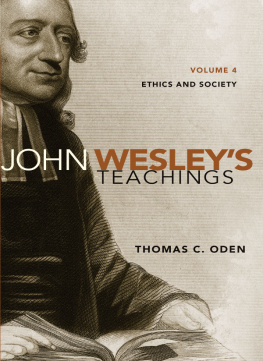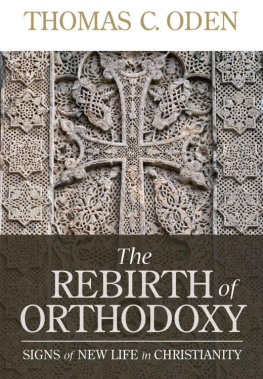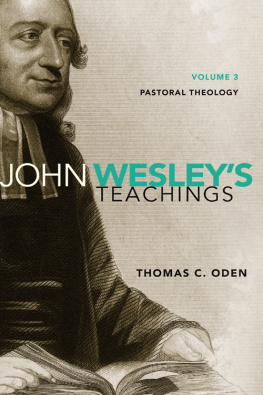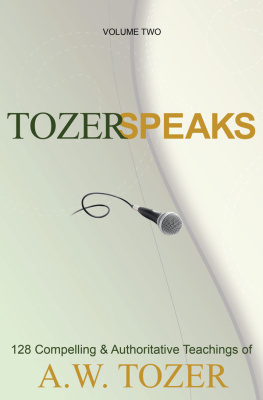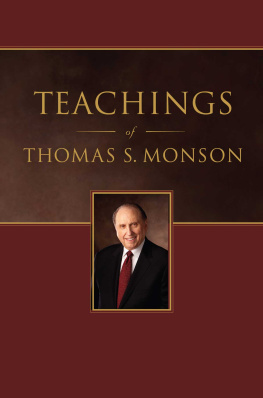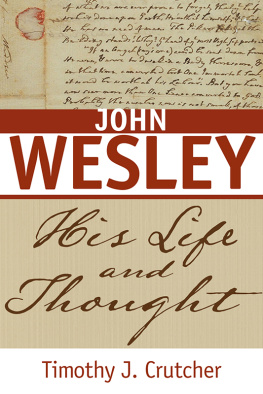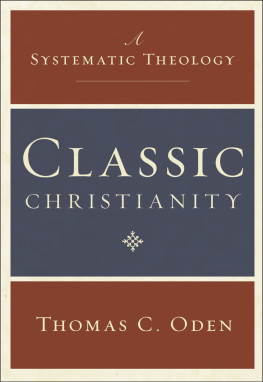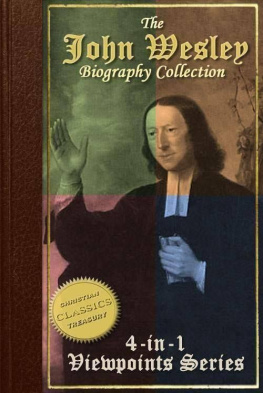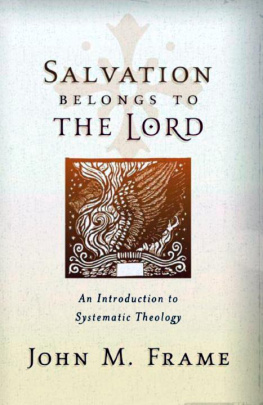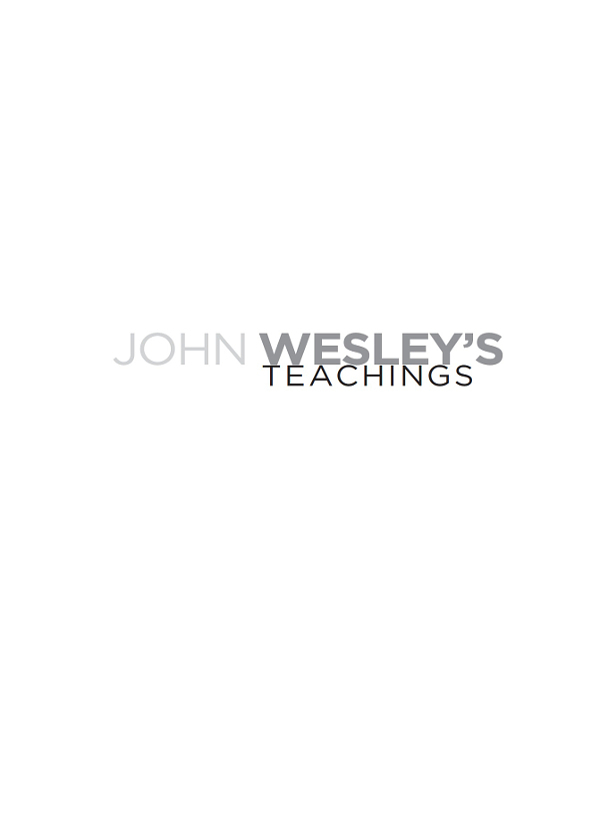Also by Thomas C. Oden
John Wesleys Teachings, Volume 1
John Wesleys Teachings, Volume 2
John Wesleys Teachings, Volume 3
John Wesleys Teachings, Volume 4
ZONDERVAN
John Wesleys Teachings, Volume 4
Copyright 2014 by Thomas C. Oden
ePub Edition July 2017: ISBN 978-0-310-58722-4
Requests for information should be addressed to:
Zondervan, Grand Rapids, Michigan 49530
Library of Congress Cataloging-in-Publication Data
Oden, Thomas C.
John Wesleys teachings / Thomas C. Oden.
v. cm.
Rev. ed. of: John Wesleys scriptural Christianity. c1994.
Includes bibliographical references and indexes.
Contents: v. 1. God and providence v. 2. Christ and salvation v. 3. Pastoral theology v. 4. Ethics and society.
ISBN 978-0-310-58718-7 (softcover)
1. Wesley, John, 1703-1791. 2. Theology, Doctrinal. 3. Methodist Church Doctrines. 4. Theology, Doctrinal History 18th century. 5. Methodist Church Doctrines History 18th century. I. Oden, Thomas C. John Wesleys scriptural Christianity. II. Title.
BX8331.3.O35 2012
230'.7092 dc23
2012001655
All Scripture quotations, unless otherwise indicated, are taken from The Holy Bible, New International Version, NIV. Copyright 1973, 1978, 1984, 2011 by Biblica, Inc. Used by permission. All rights reserved worldwide.
Any Internet addresses (websites, blogs, etc.) and telephone numbers in this book are offered as a resource. They are not intended in any way to be or imply an endorsement by Zondervan, nor does Zondervan vouch for the content of these sites and numbers for the life of this book.
All rights reserved. No part of this publication may be reproduced, stored in a retrieval system, or transmitted in any form or by any means electronic, mechanical, photocopy, recording, or any other except for brief quotations in printed reviews, without the prior permission of the publisher.
Cover design: John Hamilton Design
Cover image: Corbis Images
Interior design: Beth Shagene
Edited by Katya Covrett and Laura Dodge Weller
13 14 15 16 17 18 19 20 /DCI/ 24 23 22 21 20 19 18 17 16 15 14 13 12 11 10 9 8 7 6 5 4 3 2 1
To Judy Cincotta
Information about External Hyperlinks in this ebook
Please note that footnotes in this ebook may contain hyperlinks to external websites as part of bibliographic citations. These hyperlinks have not been activated by the publisher, who cannot verify the accuracy of these links beyond the date of publication.
Contents
VOLUME FOUR
Ethics and Society
Volume 4 of this readers guide to John Wesleys teaching focuses on the basic tenets of evangelical teaching on ethics and society. It is logically divided into four complementary parts: social ethics , economic ethics , political ethics , and theological ethics . Under these headings, Wesley has written extensively on the nurturing of responsible communities; accountability for the use of talents, time, and money; the politics of war and slavery; and the relation of gospel and law.
This volume seeks to deliver to the nonprofessional reader the gist of Wesleys teaching on basic questions of the daily practice of the Christian life. From Wesleys large corpus of writing, we will glean his teaching on faith active in love.
This last volume on ethics and society builds on crucial arguments set forth in volume 1 on God and providence, volume 2 on Christ and salvation, and volume 3 on pastoral theology. I recommend that readers who wish to begin with volume 4 keep the other three volumes handy for reference to key definitions and ideas previously discussed.
These expositions present a plain account of Wesleys teaching on the moral life, with constant citation from Wesleys own texts. For a guide to tracking references, see Tracking References to the Major Editions below. My goal is to convey concisely the core argument of major texts of John Wesley on such basic ethical themes as character, intention, action, purpose, obligation, and the happy life.
In Wesleys address to readers of his collected works of 1771, he made a preliminary attempt at a sequential organization of his instructional homilies: I wanted to methodize these tracts, to [ar]range them under proper heads, placing those together which were on similar subjects, and in such order that one might illustrate another. There is scarce any subject of importance, either in practical or controversial divinity, which is not treated of more or less, either professedly or occasionally.
Wesleys own daily practice of prayer, Scripture study, and preaching were done with the Greek New Testament in hand. Since my purpose is to convey Wesleys teaching in ordinary modern English, I will use the New International Version of the in cases where it significantly improves on the Authorized King James Version (KVJ), and the Book of Common Prayer, which Wesley followed day by day.
Wesleys moral guidance came mainly through teaching homilies and occasional essays. The issues most exhaustively treated on ethics are his thirteen discourses on the Sermon on the Mount as a summary of Christian ethics; the relation of gospel to law; and to a lesser extent, war, revolution, slavery, and what he called the reformation of morals. Virtually no major issue common to philosophical ethics and Christian moral reflection is neglected in Wesleys corpus of teaching.
Wesleys intent was never to write a comprehensive systematic ethic such as one would find in Thomas Aquinas, Luis de Molina, Francisco Surez, Alphonsus Liguori, Philipp Melanchthon, Johann Gerhard, or Richard Baxter. With the exception of a few addresses, his messages were primarily for not the university audience but small communities of those seeking to live a holy life grounded in grace.
Studying Wesley
The method I have used in examining Wesleys writings is argument analysis. This method holds closely to specific arguments in his published texts. I do not attempt to provide an account of the development of Wesleys thought nor a commentary on his works, but rather an analytical elucidation of his arguments. This means that I work textually with Wesleys key writings on ethical themes to provide a text-based analysis of his reasoning and argumentation. I ask, What reasons does Wesley give for drawing his conclusions? I show the precise location of his teaching by citations in the most frequently used editions of his Works. And I organize these texts in a commonsense arrangement so they present a coherent picture of the logic of Wesleys teaching on the right ordering of moral life.
Previous useful studies have set forth Wesleys theology, but none of them to my knowledge has attempted to do so as a systematic argument exegetically grounded on the whole range of his theological, pastoral, and ethical teaching corpus. Four volumes have been required to do justice to the content and magnitude of his reasoning and argumentation on the Christian faith and life.
Since Wesley reasoned out of Scripture and constantly in reference to Scripture texts, these texts are frequently referenced. Since Wesley also reasoned out of the classic Christian consensus, especially from patristic sources, those who wish to compare Wesleys reasoning with these patristic sources can do so by checking out the particular texts under consideration in the

